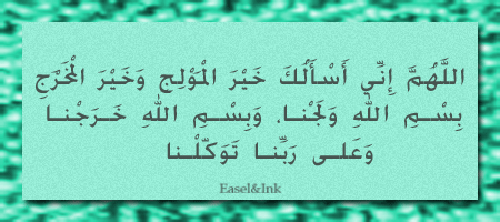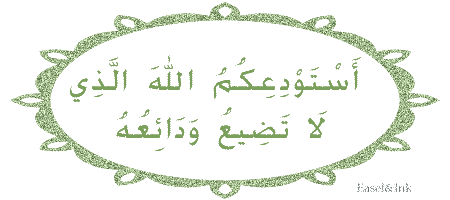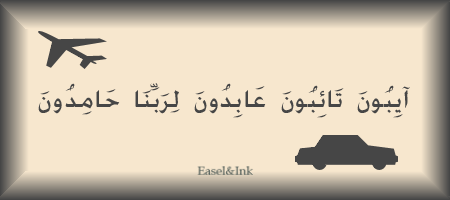
The Wonderful Library & Islamic Resource Center
World of Islamic Dawah: Islamic Library & Resource Center
|
| | | Lesson Sixteen-Taking on Islamic Manners |  |
| | | Author | Message |
|---|
Zaza
Librarian


Location : The Wonderful Art Garden
 |  Subject: Lesson Sixteen-Taking on Islamic Manners Subject: Lesson Sixteen-Taking on Islamic Manners  Thu Mar 18, 2010 4:31 pm Thu Mar 18, 2010 4:31 pm | |
|  Lesson Sixteen Lesson Sixteen
Taking on Islamic Manners Here are only some of the many Islamic manners: 1) Greeting (As-Salam) 2) A smiling, cheerful face 3) Eating with your right hand, and drinking with the same 4) Before eating or drinking, one should say, "Bismillah (In the Name of Allah)." 5) After eating or drinking, say, "Al-Hamdulillah (All praise is for Allah)" 6) After sneezing, say, "Al-Hamdulillah." 7) If another person sneezes and says "Al-Hamdulillah," say, "Yarhamukallah (May Allah have mercy on you)." 8) Visiting the sick 9) Following a funeral - by praying the funeral prayer and attending the burial. 1 0) Following Islamic manners when you enter the Masjid or your home, and when you leave them. 11) Following Islamic manners when you travel, when you deal with your parents, your relatives, your neighbors, your elders, and those younger than you. 12) Congratulating parents upon the birth of a child. 13) Saying an invocation of blessings when there is a marriage. 14) Consoling the afflicted. 15) And all other Islamic manners, including the way we wear or remove our dress and shoes. Other than the characteristics mentioned by the Shaikh, there are many other good qualities that are mentioned in the Qur'an and the Sunnah, such as gentleness, forgiveness, honor, mercy, a heart free from rancor, patience, good speech, and humility. Shaikh 'Abdul-'Aziz bin Baz (Rahimallullah) wrote a valuable dissertation entitled, "The Manners of Believing Men and Believing Women." It should be read, for it is full of great benefit. Greeting (As-Salam): To create a sense of love and unity between Muslims, it is legislated in Islam that we give greetings of peace to one another: When you are greeted with a greeting, greet in return with what is better than it, or (at least) return it equally. (Surah An-Nisa’ 4: 86) When asked which Islam is best, the Prophet (Sallallahu Alayhi wa Sallam) said: To feed others and to give greetings of peace to both he whom you know and he whom you know not. (Recorded by Al-Bukhari and Muslim) Al-Bara' (Radhi Allahu Anhu) said, "The Prophet (Sallallahu Alayhi wa Sallam) ordered us with seven matters; one of the matters he mentioned was “to spread greetings of peace." (AI-Bukhari) And the Prophet (Sallallahu Alayhi wa Sallam) said: Indeed, from the rights of a Muslim over another Muslim is that when one meets the other, he should give him greetings of peace. (Agreed upon) Spreading greetings of peace causes Muslim brothers to love one another, which is what we need to enter Paradise, for the Prophet (Sallallahu Alayhi wa Sallam) said: You will not enter Paradise until you believe, and you will not believe until you love one another. Shall I not guide you to something, that were you to do it, you would love one another: Spread greetings of peace among yourselves. (Recorded by Muslim) The method of greeting your brother is to say, "As-Salaamu 'Alaikum wa Rahmatullahi wa Barakatuhu (peace be upon you, and Allah's mercy and blessings [also be upon you])." 'Imran bin Husain (Radhi Allahu Anhu) said that on one occasion, while the Prophet (Sallallahu Alayhi wa Sallam) was seated, a man came to him and said, ''As-Salaamu 'Alaikum (peace be upon you)." After the Prophet (Sallallahu Alayhi wa Sallam) returned the greeting and after the man sat down, the Prophet (Sallallahu Alayhi wa Sallam) said, "Ten." Then another man came and said, "As-Salaamu 'Alaikum wa Rahmatullah." After the Prophet (Sallallahu Alayhi wa Sallam) returned his greeting and after the man sat down, the Prophet (Sallallahu Alayhi wa Sallam) said, "Twenty." Finally, another man came and said the full greeting: "As-Salaamu 'Alaikum wa Rahmatullahi wa Barakaatuhu (peace be upon you, and Allah's mercy and blessings [also be upon you])." He answered him, the man sat down, and then the Prophet (Sallallahu Alayhi wa Sallam) said "Thirty," each time referring to the number of rewards achieved by the one who greeted him. (It was recorded by Abu Dawud, and At-Tirmidhi with a Sahih chain.) There are a number of manners we should keep in mind regarding the Islamic greeting: 1) We should not gesture when we greet one another, unless the gesture is accompanied by the verbal saying. 2) When you enter a room where some people are awake and others are sleeping, give greeting of peace, but in a low voice. The Prophet (Sallallahu Alayhi wa Sallam) would give greetings in such a way as to not wake up one who was sleeping, yet allowing the one who was awake to hear. (Recorded by Muslim). 3) The Prophet (Sallallahu Alayhi wa Sallam) said: The rider should greet the one walking, the one who is walking should greet the one who is sitting, and those that are few in number should greet those who are greater in number. (Recorded by Al-Bukhari and Muslim). In the narration of Al-Bukhari, the Prophet (Sallallahu Alayhi wa Sallam) also said: And the young one should greet his elder. 4) When you enter your home, it is recommended for you to give greetings of peace, for Allah Almighty says: But when you enter the houses, greet one another with a greeting from Allah, blessed and good. (Surah An-Nur 24: 61) 5) You are not permitted to initiate greetings of peace when you meet a disbeliever, for the Prophet (Sallallahu Alayhi wa Sallam) said: Do not initiate greetings of peace when you meet the Jews or the Christians. However, if they extend to you greetings of peace, you may answer them with, "Wa 'Alaikum (and upon you)." In a Hadith related by Anas (Radhi Allahu Anhu), the Prophet (Sallallahu Alayhi wa Sallam) said: If someone from the People of the Book gives you a greeting of peace, then say, "Wa 'Alaikum." (Recorded by Al-Bukhari and Muslim) 6) Not only should you greet people when you enter a gathering, you should also greet them when you leave that gathering. The Prophet (Sallallahu Alayhi wa Sallam) said: If one of you stops at a gathering, let him give greetings of peace; and if he wishes to leave, let him give greetings of peace: the first greeting is not more worthy than the second (i.e., it is important to give both). (Recorded by Abu Dawud and At-Tirmidhi). To continue Insha Allah | |
|   | | Zaza
Librarian


Location : The Wonderful Art Garden
 |  Subject: Re: Lesson Sixteen-Taking on Islamic Manners Subject: Re: Lesson Sixteen-Taking on Islamic Manners  Fri Mar 19, 2010 8:29 pm Fri Mar 19, 2010 8:29 pm | |
| A smiling, cheerful face: In a Hadith related by Abu Tharr (Radhi Allahu Anhu) the Prophet (Sallallahu Alayhi wa Sallam) said: Do not look down upon any good deed, not even to meet your brother with a cheerful face. (Recorded by Muslim) In another Hadith, he (Sallallahu Alayhi wa Sallam) said: To smile in the face of your brother is charity given on your behalf. (Recorded by Al-Bukhari in Al-Adab Al-Mufrad and At-Tirmidhi with a Sahih chain). So cheerful was the countenance of the Prophet (Sallallahu Alayhi wa Sallam) that one of his Companions, Jarir bin 'Abdullah (Radhi Allahu Anhu), said, "Since the day I accepted Islam, the Messenger of Allah (Sallallahu Alayhi wa Sallam) would never meet me without smiling in my face." (Recorded by Al-Bukhari in Al-Adab Al-Mufrad with a Sahih chain). A smiling face indicates a good quality and causes blessed results -indicates that one's heart is free of rancor and it causes affection to grow between Muslims. Eating with your right hand, and drinking with the same: The Prophet (Sallallahu Alayhi wa Sallam) said: When one of you eats, let him eat with his right hand; and when one of you drinks, let him drink using his right hand, for verily, the Shaitan eats with his left and drinks with his left. (Recorded by Muslim) Here are some more manners to keep in mind when you eat: 1) To mention Allah's Name and to eat what is closest to you, for the Prophet (Sallallahu Alayhi wa Sallam) said: O young boy, mention Allah's Name, eat with your right (hand), and eat that which is closest to you. (Recorded by Al-¬Bukhari and Muslim) 2) While you are eating, do not lean on something to relax. The Prophet (Sallallahu Alayhi wa Sallam) said, Indeed, I do not eat, reclining (on something). (Recorded by Al-Bukhari) 3) If a morsel of food falls to the ground, eat it nonetheless. Jabir (Radhi Allahu Anhu) related that the Prophet (Sallallahu Alayhi wa Sallam) said: If a morsel of food belonging to one of you should fall down, pick it up, clean off any filth that may have attached itself, and then eat it, but don't leave it for the Shaitan. (Recorded by Muslim) 4) Do not find fault with the food you eat. Abu Hurairah (Radhi Allahu Anhu said, "The Messenger of Allah (Sallallahu Alayhi wa Sallam) never found fault with food: if he desired something, he would eat it; if he disliked something, he would (simply) leave it." (Recorded by AI-Bukhari and Muslim). 5) It is recommended to lick clean both the plate one eats from and his fingers. In a Hadith related by Muslim, the Prophet (Sallallahu Alayhi wa Sallam) ordered us to do so and then said: Indeed, you do not know where the blessing is. In the narration of At-Tirmidhi, it is: Indeed you do not know in which portion of your food is the blessing. 6) When you finish your meal, you should do as the Prophet (Sallallahu Alayhi wa Sallam) did: he would supplicate, saying: All the praise and thanks are to Allah Who has satisfied our needs and quenched our thirst. Your favor cannot be compensated or denied. (Recorded by Al-Bukhari). Following Islamic manners when you enter the Masjid or your home and when you leave them: As the Muslim is entering the Masjid, it is recommended for him to enter with his right foot first, and then for him to say: In the Name of Allah, and prayers and peace be upon the Messenger of Allah. 0 Allah, open the gates of Your mercy for me. (Recorded by Muslim and Abu Dawud). When a Muslim enters his home, he should mention Allah's Name for the Prophet (Sallallahu Alayhi wa Sallam) said: When a man enters his home and mentions Allah's Name upon entering and upon eating a meal, the Shaitan says (to his fellow devils), "There is no place for you to sleep here and there is no dinner for you over here." If he doesn't mention Allah's Name upon entering, the Shaitan says (to his fellow devils), "You have found your place of rest for the night." And if he doesn't mention Allah's Name upon eating, the Shaitan says, ''You have reached your place of rest for the night and your dinner." (Recorded by Muslim, Abu Dawud, and Ibn Majah). It is also recommended to say the supplication mentioned in the following Hadith: When one of you enters his home, he should say, "0 Allah, I ask of you the best of entrances and the best of exits. In the Name of Allah we enter and in the Name of Allah we leave, and upon our Lord we place our trust." Thereafter he should give greetings of peace to his family. (Recorded by Abu Dawud with a Sahih chain). When a Muslim leaves the Masjid, he should begin with his left foot, saying: In the Name of Allah, and blessings and peace be upon the Messenger of Allah. 0 Allah, I ask You from Your favor. (Recorded by Muslim and Abu Dawud) In the following Hadith, the Prophet (Sallallahu Alayhi wa Sallam) also told us what to say when we leave our home: When a man leaves his home, he should say, "In the Name of Allah; I place my trust in Allah, and there is no might nor power except with Allah." It will be said, "That is sufficient for you: you have been guided, sufficed, and protected." The Shaitan (devil) will move out of his way and another devil will say to the first, "How can you get to a man who has been guided, sufficed, and protected?" (Recorded by Abu Dawud and An-Nasa'i with a Sahih chain) Following Islamic manners when you travel: There are certain manners that you must adhere to when you travel: 1) In an Islamic way, you should bid farewell to those you leave behind. The Prophet (Sallallahu Alayhi wa Sallam) said: Whoever is about to travel should say to those he leaves behind, "I place you in the trust of Allah, whose trust is never misplaced." (Recorded by Abu Dawud with a Sahih chain) 2) As you are about to travel, say the supplication that is specific to traveling. 'Abdullah bin 'Umar (Radhi Allahu Anhuma) said: Indeed, when the Messenger of Allah would be seated upon his mount, about to travel, he would say "Allahu Akbar" (Allah is the Most Great) three times, and then he would say, "How perfect He is, the One Who has placed this (transport) at our service, and we ourselves would not have been capable of that, and to our Lord is our final destiny. 0 Allah, we ask You for righteousness and piety in this journey of ours, and we ask You for deeds which please You. 0 Allah, facilitate our journey and let us cover its distance quickly. 0 Allah, You are the Companion on the journey, and the Successor over the family. O Allah, I take refuge with You from the difficulties of travel, from having a change of heart and being in a bad predicament, and I take refuge in You from an ill-fated outcome in terms of wealth and family. 3) When he would start his return journey, he would say the same, except he would add: We return, repenting to, worshipping, and praising our Lord. (Recorded by Muslim). 4) Because it is from Allah's favor that He has lightened certain rulings for the traveler, when you travel you should apply those lightened rulings; for instance, you should shorten your prayers; if needed, you may join them; you may continue to wipe over your socks for three days along with their nights; and you may break your fast. To continue Insha Allah | |
|   | | Zaza
Librarian


Location : The Wonderful Art Garden
 |  Subject: Re: Lesson Sixteen-Taking on Islamic Manners Subject: Re: Lesson Sixteen-Taking on Islamic Manners  Fri Mar 19, 2010 8:37 pm Fri Mar 19, 2010 8:37 pm | |
| When you deal with your parents: Being good to your parents is one of the greatest forms of worship; in fact, Allah mentioned His right along with the right of parents, and He mentioned ill-treatment of parents along with the association of partners with Him. Allah Almighty says: And whoever disbelieved, let not his disbelief grieve you, to Us is their return, and We shall inform them what they have done. Verily, Allah is the All-Knower of what is in the breasts (of men). (Surah Luqman 31: 23) And: And We have enjoined on man (to be dutiful and good) to his parents. His mother bore him in weakness and hardship upon weakness and hardship, and his weaning is in two years, give thanks to Me and to your parents, to Me is the final destination. (Surah Luqman 31: 14)There are many instances in the Sunnah wherein the Prophet (Sallallahu Alayhi wa Sallam) highlighted the importance of being good to one's parents. Ibn Mas'ud (Radhi Allahu Anhu) once said, "I asked the Messenger of Allah (Sallallahu Alayhi wa Sallam) which deed is most beloved to Allah?" He (Sallallahu Alayhi wa Sallam) said: "Prayer in its time." Ibn Mas'ud (Radhi Allahu Anhu) then asked, "And then which?" He (Sallallahu Alayhi wa Sallam) said, "Dutifulness to one's parents." "Then which?" He (Sallallahu Alayhi wa Sallam) said, "Fighting in the way of Allah." (Recorded by Al-Bukhari and Muslim) 'Abdullah bin 'Arnr (Radhi Allahu Anhu) related that a man said, "0 Messenger of Allah, I pledge allegiance to you: to emigrate and to perform Jihad." The Prophet (Sallallahu Alayhi wa Sallam) asked: "Are any of your parents alive?" He said, "Yes, both of them." The Prophet (Sallallahu Alayhi wa Sallam) asked, "And you seek reward from Allah?" He said, ''Yes.'' And then the Prophet (Sallallahu Alayhi wa Sallam) commanded: "Then go back to your parents and be a good companion to them." (Recorded by Muslim) Being dutiful to one's parents is one of the causes to enter Paradise. Abu Hurairah (Radhi Allahu Anhu) related that he heard the Messenger of Allah (Sallallahu Alayhi wa Sallam) say: "Ignominy upon him, ignominy upon him, ignominy upon him." He (Sallallahu Alayhi wa Sallam) was asked, "Upon whom, 0 Messenger of Allah?" He (Sallallahu Alayhi wa Sallam) said "Whoever has one or both of his parents with him when they reach old age and then does not enter Paradise." (Recorded by Muslim) The Prophet (Sallallahu Alayhi wa Sallam) also said: The father is the middle door (from among the doors) of Paradise. (Recorded by At-Tirmithi and Ibn Majah with a Sahih chain) Mu'awiyyah bin Jahimah, (Radhi Allahu Anhuma) related that his father, Jahimah, went to the Prophet (Sallallahu Alayhi wa Sallam) and said, "0 Messenger of Allah, I wished to fight, so I came here seeking your counsel" The Prophet (Sallallahu Alayhi wa Sallam) asked: "Do you have a mother (who is alive)?" He said, "Yes." "Stick close to her, for verily, Paradise is at her leg." (Recorded by An-Nasa'i and Ahmad with a Sahih chain.) In another narration, the Prophet (Sallallahu Alayhi wa Sallam) said: "Stick close to her, for verily, Paradise is under her feet." (Recorded by An-Nasa'i and Ahmad with a Sahih chain). Being dutiful to one's parents is a cause which leads to Allah's pleasure, for the Prophet (Sallallahu Alayhi wa Sallam) said: The pleasure of the Lord is in the parents' pleasure; His anger is in their anger. Moreover, being dutiful to one's parents leads to an increase in sustenance and life, the Prophet (Sallallahu Alayhi wa Sallam) said: Whoever wishes to have his life extended and his sustenance increased, then let him be dutiful to his parents and let him nurture relations with his relatives. (Recorded by Ahmad) In fact, being dutiful to one's parents causes all good, wards off all evil; here are a number of ways in which you can fulfill your duty to them: 1) Feed them, clothe them, serve them, and answer them when they call you. 2) Obey them, for the Prophet (Sallallahu Alayhi wa Sallam) said: Obey your parents, if they command you to leave your land then leave it for them. (Recorded by Al-Bukhari in Al-Adab Al¬-Mufrad with a Sahih chain) 3) Be humble with them and speak gently with them. 4) Do not call them by their names. 5) When you walk with them, walk behind them. 6) Do to them what you would like to be done to you, and hate for them what you would hate for yourself. 7) Whenever you pray to Allah, ask Him to forgive them. 8) Honor your parents' friends. But know that whatever you do to show your duty toward them, you can never fulfill the rights they have upon you, so great are their rights. The Prophet (Sallallahu Alayhi wa Sallam) said: A son cannot pay his father back unless he finds him a slave, buys him, and then sets him free. (Recorded by Muslim) To continue Insha Allah | |
|   | | Zaza
Librarian


Location : The Wonderful Art Garden
 |  Subject: Re: Lesson Sixteen-Taking on Islamic Manners Subject: Re: Lesson Sixteen-Taking on Islamic Manners  Fri Mar 19, 2010 9:50 pm Fri Mar 19, 2010 9:50 pm | |
| Your relatives: Abu Ayyub (Radhi Allahu Anhu) related that when a desert Arab asked the Prophet (Sallallahu Alayhi wa Sallam) to inform him of what would bring him closer to Paradise and farther away from the Fire, He (Sallallahu Alayhi wa Sallam) said: Worship Allah, and do not associate any partners with Him; establish the prayer; pay the compulsory charity; and join relations with your relatives. (Recorded by Al-Bukhari and Muslim). Abu Hurairah (Radhi Allahu Anhu) reported that the Prophet (Sallallahu Alayhi wa Sallam) said: Allah Almighty created the creation, and when He finished doing so, the womb stood. Allah said, "What is this?" It said, "This is where refuge is sought in You from those who cut off relations." He said, "Are you not pleased that I will join those that are good to you and that I will cut off those who cut you off." It said, "Indeed, yes, 0 my Lord." And then He said, "Then that is for you." After mentioning the Hadith, Abu Hurairah (Radhi Allahu Anhu) said, "And recite, if you wish: Would you then, if you were given the authority, do mischief in the land, and sever your ties of kinship? (Surah Muhammad 47: 22) (Recorded by Al-Bukhari and Muslim) Like in obedience to one's parents, joining relations with relatives by dealing honorably and kindly with them also causes one's life to be prolonged, for the Prophet (Sallallahu Alayhi wa Sallam) said: Whoever would love for his sustenance to be made abundant for him and for his time (of death) to be delayed, then let, him join ties with relatives. (Recorded by Al-Bukhari and Abu Dawud) To join ties means to avoid hurting one's relatives; it means to visit them, to pray for them, to help them financially, to order them to do good, to forbid them from evil, and to advise them. Allah Almighty said to His Prophet (Sallallahu Alayhi wa Sallam): And warn your tribe of near kindred
(Surah Ash-Shu’ara’ 26: 214) Your neighbors: Refer to lesson fifteen, where this topic has been discussed. Your elders: During a dispute, when one was required to speak before the Prophet (Sallallahu Alayhi wa Sallam) the youngest one present attempted to speak; the Prophet (Sallallahu Alayhi wa Sallam) said: Older, older. Admonishing the young man for having spoken before his elders had the opportunity to speak. (Recorded by Al-Bukhari and Muslim) The Prophet (Sallallahu Alayhi wa Sallam) said: Indeed, from the ways of glorifying Allah is to honor graying Muslim; the one who carries with him the Qur'an, who neither deals extremely with it nor turns away from it; and the just leader. (Recorded by Abu Dawud, and it is Sahih) He (Sallallahu Alayhi wa Sallam) also said: He is not from us who neither shows mercy to the young from us nor knows the honor of the old from us. (Recorded by Abu Dawud and At-Tirmidhi and it is Sahih). To honor our elders also means to honor our scholars, because by their knowledge and virtues, they too deserve veneration. And those younger then you: The Prophet (Sallallahu Alayhi wa Sallam) said: He is not from us who does not show mercy to the young from us. (Recorded by Abu Dawud and At-Tirmidhi) He (Sallallahu Alayhi wa Sallam) used to show compassion and mercy to children, playing with them and showing kind patience in the face of their whims. For instance, he carried his granddaughter, Umamah, during prayer. He would play with Al-Hasan and Al-Husain. On one occasion he used rhythmic words to make the brother of Anas bin Malik, Abu 'Umair feel better. The latter was perhaps feeling sad after his pet bird, Nughair, died, and the Prophet (Sallallahu Alayhi wa Sallam) said jokingly: O Aba 'Umair, what has An-Nughair done. Congratulating someone upon the birth of a child: Because this practice brings happiness into the heart of a Muslim, one should strive to congratulate the new parents, praying for them and for their newborn. Muslim related that Al-Hasan AI-Basri taught a man how to congratulate another on the occasion of a new born: "May you be blessed in what you have been bestowed with; may you thank He that gave; may your child reach the age of reason, and may you be blessed by him being dutiful to you." In another narration Al-Hasan taught him to say, " May Allah make him blessed for you and for the nation of Muhammad (Sallallahu Alayhi wa Sallam) (Recorded by At-Tabarani with a Hasan chain) After saying that it is recommended to give congratulations upon the birth of a child, Imam An-Nawawi said, "Our companions (i.e., those who are from his school of thought in jurisprudence) said, 'It is recommended to give congratulations upon the birth of a child, just as Al-Husain (Radhi Allahu Anhu) taught a man to say the following: "May Allah bless you in what you have been given; may He make you thankful to the One Who gave; may your child grow up to maturity; and may you be blessed by him being dutiful to you." If you are the father and have been congratulated, it is recommended for you to answer, "May Allah bless you and send blessings upon you; may He reward you well; may He provide you with one similar; and may He increase your rewards." It is recommended to say this or something similar. Consoling the afflicted: The Messenger of Allah (Sallallahu Alayhi wa Sallam) said: Whoever consoles his brother believer in his adversity, Allah will attire him with a green dress on the Day of Judgement, for which he will be envied. (It was recorded by Al-Khattib in Tarikh Baghdad and Ibn 'Asakir, and there is a supporting narration for it with Ibn Abu Shaybah. It is a Hasan Hadith which Al-Albani graded Hasan in Al-Irwa' no. 15.) When you console people who are afflicted, you should say those words that will bring them comfort, that will drive away their grief - words that strengthen those that are grieved, making them patient, and satisfied with Allah's Decree. You can either use words that have been related from the Prophet (Sallallahu Alayhi wa Sallam) or you can say any kind words, as long as they do not contradict the Shari'ah. When the Prophet (Sallallahu Alayhi wa Sallam) was comforting his daughter for her loss, he said: Indeed to Allah belongs what He takes, and to Allah belongs what He gives; everything with him is until an appointed term, so be patient and seek your reward from Him. (Recorded by Al-Bukhari and Muslim). An-Nawawi said, "This Hadith is the best form of consoling someone." When the Prophet (Sallallahu Alayhi wa Sallam) met Umm Salamah after her loss, he (Sallallahu Alayhi wa Sallam) said: O Allah, forgive Abu Salamah; raise him in ranking with those whom you have guided, and leave behind for him from his progeny from those who remain. Forgive us and him, 0 Lord of all that exists; make his grave spacious for him and illuminate it for him. (Recorded by Muslim). There is no set period, beyond which one should not console someone - some people mistakenly think that the limit is three days, while others have mentioned other limits. In one narration, the Prophet (Sallallahu Alayhi wa Sallam) consoled the family of Ja'far (Radhi Allahu Anhu) after three nights. And all other Islamic manners ...: Islam has legislated many manners for the Muslim, manners that cover every aspect of his life: manners for going to the washroom, for going to the Masjid, for visiting the sick, for sitting in a gathering, for seeking knowledge, for walking in the road, for visiting brothers, for talking, and so on. Though we have mentioned some Islamic manners here, we have certainly not mentioned them all; there are books that deal specifically with Islamic manners, such as Al-Adab Ash-Shar'iyah by Ibn Muflih, and Al-Adab Al-Mufrad by Al-Bukhari. | |
|   | | Sponsored content
 |  Subject: Re: Lesson Sixteen-Taking on Islamic Manners Subject: Re: Lesson Sixteen-Taking on Islamic Manners  | |
| |
|   | | | | Lesson Sixteen-Taking on Islamic Manners |  |
|
Similar topics |  |
|
| | Permissions in this forum: | You cannot reply to topics in this forum
| |
| |
| |
|









 Please check our
Please check our 


















